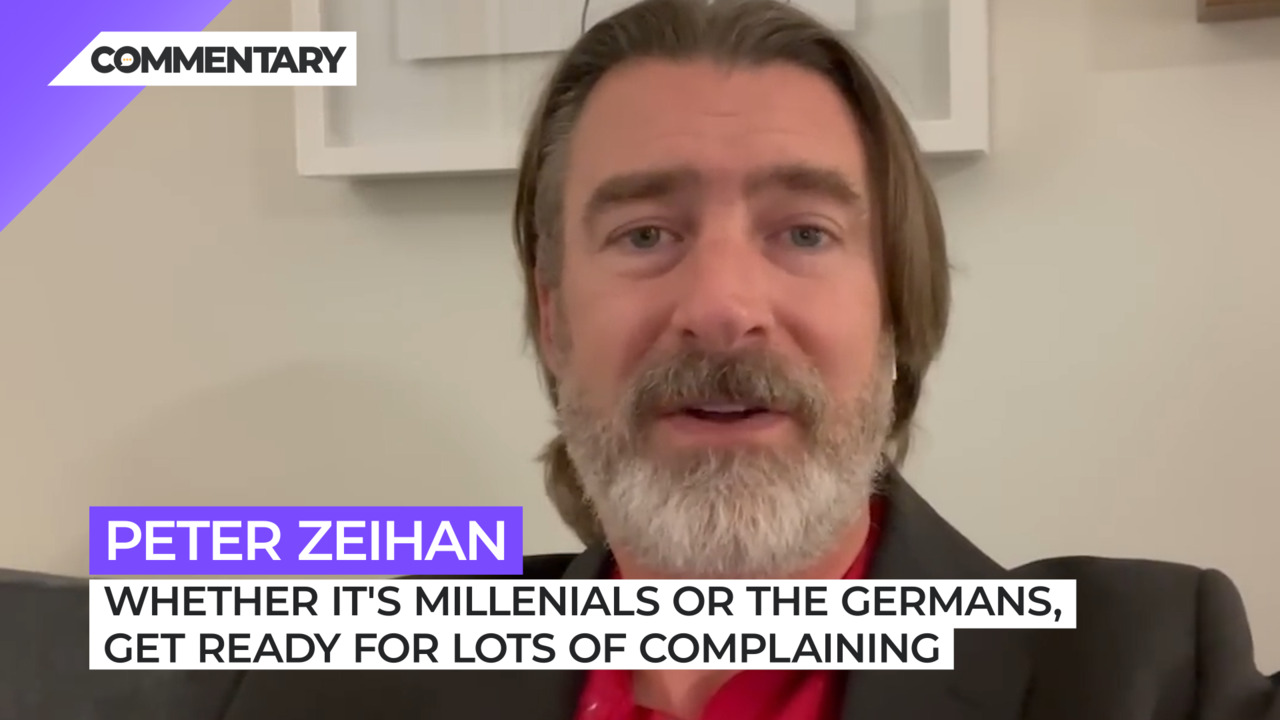
Commentary
-
Our commentary partners will help you reach your own conclusions on complex topics.
Hey everyone, Peter Zeihan here coming to you from an exciting hotel room. It is the second of November and the Federal Reserve just raised interest rates by another three quarters of a percent. So I thought it would be a good idea to give you an idea of why the Fed is doing what it’s doing, and what that means for all of us.
Normally, interest rates are a tool that is used to regulate demand. The idea being that when demand falls, you want to lower interest rates, so you can get it back up and get some normal economic activity moving again. And in the case of the United States, most of our demand is coming from the millennial class, people who are aged in their 20s and their 30s. Which is normal. This is the…age group that normally is buying homes and raising kids and buying…cars. Sorry, lost the word there for a second. And in that this is no atypical period, but when the Federal Reserve looks around the world, they’re discovering that the millennials in the United States don’t have a lot of peers around the world. There aren’t really very many German or Chinese or Japanese or Korean millennials at all.
So it’s not that the Fed is overly concerned about the current economic conditions with inflation, although they are. But they’re really thinking to what happens the next time, because we have a number of countries who cannot increase interest rates enough to regulate demand because they don’t have demand. So if they raise them too high too fast, or really moderately at all, it will be their last economic expansion. And even before you consider the economic impacts of things like the Ukraine War, this was always going to be the end of the road for a lot of East Asia and Europe. It’s just down to the numbers. So when the Federal Reserve is looking at this, they’re like, holy crap, this tool will work for us but it won’t work anywhere else.
Which means the next time American demand falters, the next time the United States falls into recession, we better make sure we have as many monetary tools as possible. So they’re not going to stop when rates get to 4%, they’re probably not going to stop when rates get to 6%. Six percent is kind of the minimum for what they need in the midterm to deal with the next economic crisis. So you shouldn’t expect the Fed to stop because there’s a lot of whinging. Now on the topic of whinging, there’s going to be a great deal. and I would say that it comes from two places. Number one are those industries that have boiled up over the last 15 years in an environment of basically having free capital. We had interest rates at zero for a decade. And in many cases, interest rates went negative either because of central banks doing it directly like they did in say, Europe, or indirectly, like the United States did with its quantitative easing programs. But regardless, when money is free, all kinds of weird shit happens.
Past periods of low interest rates gave us the Chinese boom. Well, that’s over. Past periods gave us the Japanese boom. That’s over. Past gave us sub-prime. That’s over. In the current boom, we’re getting cryptocurrency. And this is no different from any other technological marvel that we’ve had in previous economic expansions. So you shouldn’t…you should expect high credit cost….just like everything else. The tech sector in Silicon Valley writ large is more aware of this. They’ve been a little bit around a little bit longer. But it’s no surprise to anyone in San Jose that they’re facing massive crunches. Because ultimately, tech requires a lot of young people and a lot of capital. The capital is necessary to pay the young people to do all the big think-work to operationalize the technologies, to prototype it, and then to get them out there and keep them updated. That’s all very expensive.
And if the cost of capital doubles, quadruples, or more, that becomes harder. So whether it’s a prospective technological marvel or something that’s a little bit more bread and butter, like say Twitter or Facebook or Tesla, you should expect a lot of whinging as they’re dealing with a capital environment that their business plans were not designed for. Second, the millennials. The millennials, the oldest ones, were born in 1980. Which means they have not had any experience with high interest rates and high capital cost their entire adult lives. And yes, yes, yes, we have all heard about how life for the millennials has been so hard. But now it’s going to be hard with 9% interest rates.
Give you an idea what that feels like. In the fourth quarter of last year, it was still possible to get a mortgage at a 3% rate. By the end of the first quarter of next year, it’s going to be impossible to get one with less than a 9% rate. And that six-point increase from three to nine that increases the monthly payout or the monthly payment requirements for your mortgage by 50%. And look at your mortgage. Could you afford one that is 50% higher? Now apply that across the entire millennial cadre for people who are in their first or maybe second home and think about what that does to their life choices. Think about what that does to their political decisionmaking. We’re about to experience that en mass.
The annual payments that the federal government has to make on interest will go up by at least a half a trillion. That’s just kind of baked into the pie right now. So what does this mean on a broader scale? Well, it’s actually worse than it sounds. Because while interest rates are going up rapidly in the United States, remember, they can’t go up as rapidly everywhere else. And so if you’ve got a bunch of money in a foreign country, and you want to invest it somewhere, you want to put it in a rock-solid asset, preferably one with a guarantee by the government. You want to put it into a place that preferably has an appreciating currency. And you want to put it into a place where the underlying economic growth is stable to positive. Well, that floods it all here.
So at the same time rates are going up, we’re also going to be seeing the United States hoovering up capital from the world over. And the country that I am most worried about is Germany. Germany has run a very tight ship from a fiscal point of view for decades. However, the financial crisis…in Europe is brewing up because of what’s going on with interest rates here and the capital transfers and the capital flight, combined with the Ukraine War, which is crashing energy supplies to the German system and sending prices through the roof, is damaging the entire economic model of the country.
Also, Germany doesn’t have a lot of young people anyway, so they depend upon exports. And anything that slows down the world writ large is devastating for them. And now this is all hitting at the same time. But finances in Germany are relatively liberalized, so the people can get their money out to safer places. Germany is likely to be the first of the European countries to enact broad scale capital controls. Because very soon, they won’t have a choice. Okay, so whether it is crypto or millennials, the Germans…get ready for a lot of complaining. This is gonna get a lot worse before it gets better. Okay, that’s it for me. Until next time.
-
Hurricane Helene hits US coast, Appalachia and beyond
Hurricane Helene hit Florida and Georgia overnight between Sept. 26 and 27 as a Category 4 hurricane, and accompanying storms will continue reaching deeper into the continental United States today. Dangerous flash flooding from the hurricane, known as storm surge, was some of the worst flooding that the Tampa Bay area has ever seen, and… -
Israel holds upper hand against Lebanon, Hezbollah and Iran
On Wednesday, Sept. 25, Hezbollah launched a ballistic missile at Tel Aviv in retaliation for Israel’s explosive pager attack that blew up devices across Lebanon. Although Israel’s defense systems intercepted the surface-to-surface missile, the attempted strike on Tel Aviv marked a significant escalation by Hezbollah. Since the siege on Gaza began, shortly after the Oct. 7, 2023,… -
The Sinaloa Cartel civil war
Fears of a civil war within the Sinaloa Cartel are growing as violence between competing factions within the cartel continues. The Mexican Army has dispatched around 600 elite troops to Sinaloa to help quell those fears, in addition to roughly 2,200 regular soldiers and National Guard. Watch the above video as Straight Arrow News contributor… -
New Ukrainian weapons hit Russia where it hurts
Ukrainian drones struck a major Russian ammunition depot, triggering a massive explosion that was captured on camera. According to the Ukrainian military, 2,000 tons of munitions had arrived at the depot before the attack. Over the past two years, Ukraine has significantly increased its domestic drone production, allowing it to scale up attacks on military… -
Weighing social costs vs. economic benefits on immigration
Global human migration is one of the defining elements of our current historical era, according to the United Nations. Migrants face both the incentives to leave — forced out by climate change, crime and corruption, extreme poverty or violence — and incentives for where to go, based on available job opportunities and so on. Migration…
Latest Stories
-
 Getty Images
Getty Images
Potential top seeds still making their case for NCAA tournament committee
-
 Getty Images
Getty Images
DOD identifies $80 million in diversity and climate spending
-
 Getty Images
Getty Images
Severe weather threatens Mardi Gras celebrations in New Orleans
-
 Getty Images
Getty Images
MLB spring training: Mixed bag for National League teams 1 week in
-
 Getty Images
Getty Images
Illegal border crossing apprehensions plunge to 8,300 in February: Report
Popular Opinions
-
In addition to the facts, we believe it’s vital to hear perspectives from all sides of the political spectrum.
Latest Opinions
In addition to the facts, we believe it’s vital to hear perspectives from all sides of the political spectrum. We hope these different voices will help you reach your own conclusions.
The opinions published in this section are solely those of the contributors and do not reflect the views of Straight Arrow News.





















Latest Commentary
We know it is important to hear from a diverse range of observers on the complex topics we face and believe our commentary partners will help you reach your own conclusions.
The commentaries published in this section are solely those of the contributors and do not reflect the views of Straight Arrow News.
Dr. Frank Luntz
Pollster and Political Analyst‘Biased’: What Americans think of ‘mainstream media’
‘Getting rid of them’: Americans discuss Trump and immigration
‘Woke’: Why some Biden 2020 voters backed Trump in 2024